It’s Judgment Day at ttff/18
Francesca Hawkins, Director of Judgement Day writes about LGBQTIA film activism
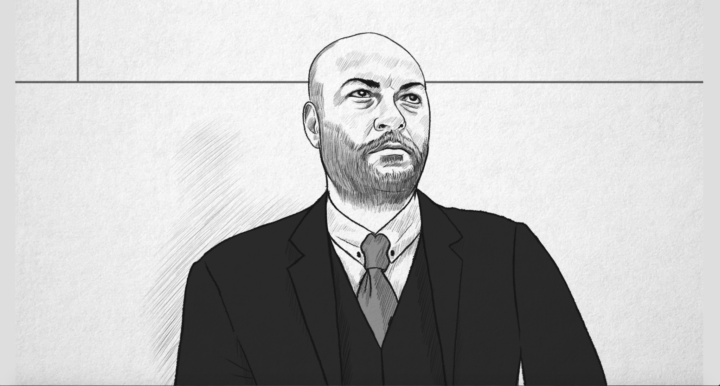 Court Artist Sketch of Jason Jones
Court Artist Sketch of Jason Jones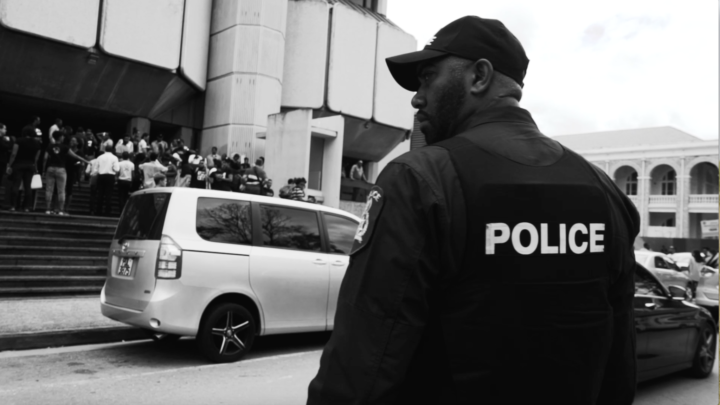
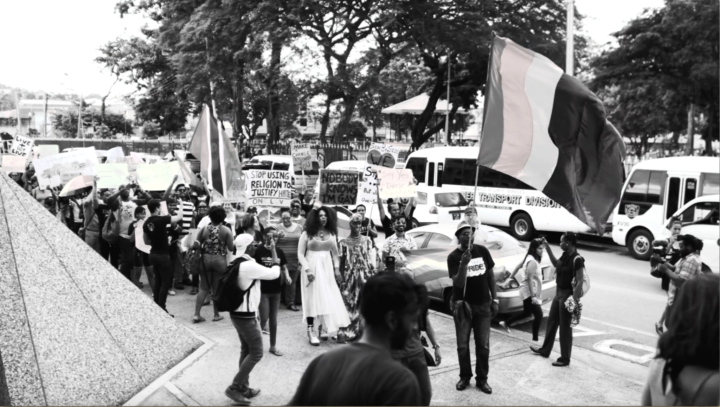
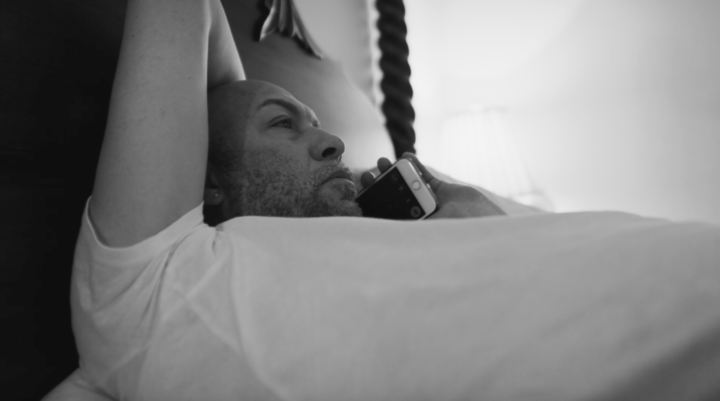 Jason Jones
Jason JonesFrancesca Hawkins, Director of Judgement Day writes about LGBQTIA film activism
 Court Artist Sketch of Jason Jones
Court Artist Sketch of Jason Jones

 Jason Jones
Jason JonesGrundlos Kollektiv (founded by Johanna Nahous) is a platform for progressive minds of any field or discipline, who are passionate about introducing new ideas, concepts and perspectives – being socially or politically influential with their art form, whatever it may be. Currently managed by Culturego Magazine, Grundlos Kollektiv is an inviting, enabling and flexible open-plan space in the center of Port of Spain. It is a home for a community of minds – different and alike – to create (Art exhibitions, film screenings, fashion shows, discussions, educational talks, yoga classes, social events) and to share their work with a diverse audience.
ttff has partnered with Grundlos Kollektiv to present:
Thursday 20 September, 7pm – 10pm/ART FILM curated by Culturego Magazine / free event
Films with Art. Film as Art. Art as film. Culturego Magazine presents a selection of short films from Caribbean filmmakers and visual artists: Dean Arlen (Trinidad and Tobago), Di – Andre Caprice (Jamaica), Ada M. Patterson (Barbados), Volney Smith (Barbados) and Rodell Warner (Trinidad and Tobago). Dean Arlen and Di -Andre Caprice will also be present for a Q+A session with the audience. DJ L Bee will close off the evening with his Funky Lounge. Film Still from Yuh Too Sweet
Film Still from Yuh Too Sweet
ART FILMS
East Waves, by Di- Andre Caprice, Jamaica
Anima Regalias by Rodell Warner, Trinidad and Tobago
Fragmentz by Volney Smith, Barbados
Sensing Travel by Dean Arlen, Trinidad and Tobago
Yuh too Sweet by Ada M. Patterson, Barbados
Saturday 22 September, 8.30pm – 10pm/The FUTURE is FEMALE. (in partnership with Women. Everywhere.) /free event
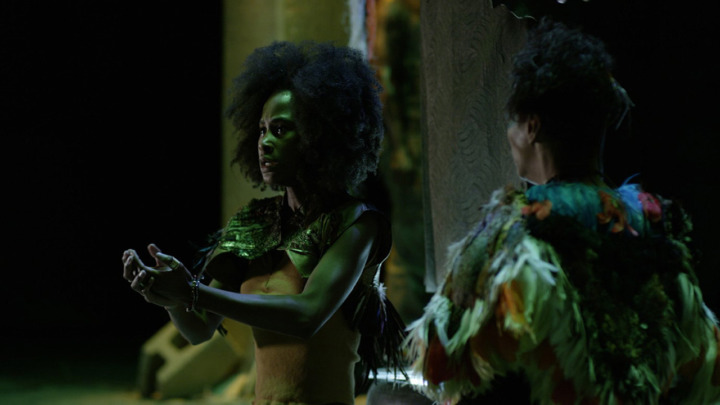 Film still from Brown Girl Begins
Film still from Brown Girl Begins
Meet and Greet with Sharon Lewis, Director – Brown Girl Begins (2017). Rooted in Caribbean folklore, Brown Girl Begins is the first ever Caribbean Sci-Fi film to be made, the protagonist is female and she is of Caribbean descent. Adeline Gregoire (Director – Women. Everywhere.) talks to Sharon Lewis about Afro-futurism, empowerment and a future which represents the true diversity of women.
RSVP: info.womeneverywhere@gmail.com
Sunday 23 September, 3 – 7pm – free event/Activism Day/free event
3pm: Screening of The Reel Human Rights films + Panel Discussion, sponsored by the High Commission for Canada
I Choose You – directed by Siobhan Millette
Please See Attached – directed Andrei Pierre
Judgment Day – directed by Francesca Hawkins
The filmmakers and activists from the LQBTQIA community will be present for the Panel Discussion; as well as the Canadian High Commissioner, Her Excellency Carla Hogan Rufelds.
4:30pm: Staging the Revolution
Join us for two very special panels dedicated to the LGBTQIA community and hman rights; then, Rhonda Chan Soo takes a fresh look at social activism in Trinidad and Tobago today, led by Girl Be Heard TT and The 2 Cents Movement. From the idea of change, to the mind bomb, to the whistle blowers, to activists tirelessly doing the work: It takes a revolution – however small – to change the world.
A recognition for a crisis in the Caribbean.
The Trinidadian and Tobago Film Festival came to a close last week and the Amnesty International Human Rights Prize went to “Cargo,” a Bahamian film about the Haitian migration crisis. Its filmmaker Kareem Mortimer was thrilled at the honor and said his project speaks to a larger story to tell.
“It feels incredible and not even for me, but for the film — because it’s important for films to raise awareness about things that are important for us and our community,” he said.
Although he was not one of the deciding judges for his award, he has an idea as to why his film stoodout among others and the type of message it brought to the light.
“I think all over the world there’s a sort of a migration crisis happening and a type of language we use for migrants and sources, and this is happening all over the Caribbean, Africa, Europe — and it’s a global topic,” said Mortimer.
Caribbean film that focuses on the issue of human trafficking – but from the point of view of reluctant trafficker, has won the Amnesty International Human Rights Prize.
Cargo by Bahamian film director Kareem Mortimer, won the top Prize at the recently concluded trinidad+tobago film festival, (ttff).
The Amnesty International Human Rights Prize is awarded to a Caribbean filmmaker whose film best highlights a human rights issue. The Award recognizes the importance of film as a vehicle for raising awareness about human rights issues and advancing inclusion and social justice.
The Trinidad and Tobago Film Festival (ttff) will once again underline the importance of film as a vehicle for raising awareness about human rights issues and advancing inclusion and social justice, with the awarding of the Amnesty International Human Rights Film Prize.
Established in an effort to support the promotion of human rights in Trinidad and Tobago and the Caribbean, the Amnesty International Human Rights Prize will be awarded to a Caribbean filmmaker whose film best highlights a human rights issue.
The winning film will be chosen by a three-person jury, which this year comprises Gregory Sloane-Seale, National Coordinator, Citizen Security Programme in the Ministry of National Security; Dr Gabrielle Hosein, Head of Department and lecturer, Institute for Gender and Development Studies, at The University of the West Indies, and Pamela Carmona, Regional Youth and Activism Coordinator at the, Amnesty International Americas Regional Office, in Mexico.
The Trinidad and Tobago Film Festival will once again underline the importance of film as a vehicle for raising awareness about human rights issues and advancing inclusion and social justice, with the awarding of the Amnesty International Human Rights Film Prize. Established in an effort to support the promotion of human rights in Trinidad and Tobago and the Caribbean, the Amnesty International Human Rights Prize will be awarded to a Caribbean filmmaker whose film best highlights a human rights issue
The importance of film as a vehicle for raising awareness about human rights issues and advancing inclusion and social justice, will once again be highlighted at the trinidad+tobago film festival through the awarding of the Amnesty International Human Rights Film Prize.
Established in an effort to support the promotion of human rights in Trinidad and Tobago and the Caribbean, the Amnesty International Human Rights Prize will be awarded to a Caribbean filmmaker whose film best highlights a human rights issue.
The winning film will be chosen by a three-person jury, which this year comprises Gregory Sloane-Seale, National Coordinator, Citizen Security Programme in the Ministry of National Security; Dr Gabrielle Hosein, Head of Department and lecturer, Institute for Gender and Development Studies, at The University of the West Indies, and Pamela Carmona, Regional Youth and Activism Coordinator at the, Amnesty International Americas Regional Office, in Mexico.
Continuing it series of Community Cinergy film screenings on issues of human rights, the trinidad+tobago film festival (ttff) will be focusing on domestic violence with a public screening of the film Private Violence, on Sunday 19 April, 4pm, at the Laventille Community Complex in Movant.
The series is sponsored by the US Embassy. The screening of Private Violence, which will be followed by a discussion, takes place in association with the organisations the Hearts and Minds of the Police Service and FireCircle.
The ttff will also be hosting a special, schools-only screening of the film Bully, followed by a workshop conducted by the Anti-Bullying Association of Trinidad and Tobago, at the Southern Academy for the Performing Arts, San Fernando, on 22 April.
According to the ttff’s founder and director, Bruce Paddington, “Film is a powerful medium for public education and advocacy. It has an ability to bear witness and tell stories that challenge individuals and encourage understanding, empathy and a demand for justice for all. We are thrilled to have the support of the US Embassy in this initiative.”
About Private Violence (Cynthia Hill/2014/USA/81′)
Developed as a public advocacy vehicle that engages audiences in debates, prevention and other public-action strategies, Private Violence raises a troubling fact: that sometimes the most dangerous place for a woman is in her home. This award-winning documentary takes us behind closed doors into the often invisible world of domestic violence. Through the eyes of two survivors and an advocate, we bear witness to the complicated and complex realities of intimate-partner violence. The film shatters general assumptions about why women stay in abusive relationships, and will form the basis of a public discussion to take place after the film.
The community discussion will be led by:
Officer Kevin Romany, Hearts and Minds, Inter-Agency Task Force, Trinidad and Tobago Police Service
Diana Mahabir-Wyatt, The Coalition Against Domestic Violence
Sherna Alexander, The Organisation for Abused and Battered Individuals
Nicole Hendrickson and Steve Cupid Theodore, FireCircle
Luke Sinnette, The Coalition Advocating for the Inclusion of Sexual Orientation
Cherylann Gajadhar, author of the book The Girl in The Cupboard and child abuse survivor
Working Women for Social Progress
Admission to the screening is free.
The trinidad+tobago film festival (ttff) continues to use film as a vehicle for social discourse and transformation, through its annual community Cinergy film series. On April 12, 19 and 22, the ttff and the US Embassy—sponsors of the series—will present three free film screenings to promote human rights.
Working with community activists and the embassy, the ttff will promote public awareness for the protection of the rights of women, children and the LGBT community in Trinidad and Tobago. The screening of three US films with topical and local resonance, focusing on domestic violence, bullying and gay-rights issues will each be followed by a community discussion, workshop and panel discussion, respectively, in order to foster dialogue on the issues of personal freedom, security, community support, public policy and legislation.
“Advancing human rights is central to our foreign policy,” Stephen Weeks, Public Affairs Officer of the US Embassy said, “and the fantastic programme put together by our friends at ttff demonstrates how film can start conversations that build stronger, more inclusive communities.”
The issues to be highlighted and films to be screened are:
LGBT rights: Pariah (Dee Rees/2011/86’/) on Sunday 12 April, 6:30pm, Woodbrook Youth Facility
In the coming-of-age film Pariah, Alike is a shy but talented Brooklyn teenager striving to survive adolescence with grace, humour and tenacity—sometimes succeeding, sometimes not, but always moving forward. The film follows her as she struggles with her conflicting identities, risks friendship and family, and faces heartbreak in a desperate search for sexual expression. There will be panel discussions before and after the film. This screening is being held in association with the Coalition Advocating for Inclusion of Sexual Orientation (CAISO).
This film is rated for viewers aged 16 years and over.
Domestic violence: Private Violence (Cynthia Hill/2014/81’/PG13) on Sunday 19 April, 4:00pm, Laventille Community Complex
Sometimes the most dangerous place for a woman is in her home. Private Violence, an award-winning documentary, takes us behind closed doors into the often invisible world of domestic violence. Through the eyes of two survivors and an advocate, we bear witness to the complicated and complex realities of intimate-partner violence. The film shatters general assumptions about why women stay in abusive relationships, and will form the basis of a public discussion led by community activists after the film.
This film is rated PG13.
Bullying: Bully (Lee Hirsch/2011/98’/PG13) on Wednesday April 22, 9:00am, Southern Academy for the Performing Arts (SAPA)
As the problem of bullying in schools becomes more critical, this presentation of the documentary Bully, to be followed by a workshop, seeks to engage students and educators in preventing the problem and finding solutions. The film offers an intimate, unflinching look at how bullying has touched five kids and their families. This will be a special screening for students; schools wishing to attend are invited to email ttff’s Director of Community Development, Melvina Hazard, for information and bookings at melvina@ttfilmfestival.com. There will be a workshop conducted by the Anti-Bullying Association of Trinidad and Tobago after the film.
This film is rated PG13.
Admission to all three screenings is free.
Image: A still from Pariah